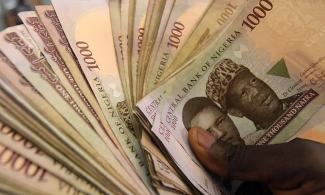
The BBC reports that its Global Disinformation Team has spoken to whistle-blowers working for two undisclosed political parties and prominent social media influencers who have described it as "an industry".
An investigation by the British Broadcasting Corporation (BBC) has revealed that political parties have been secretly paying some social media influencers across Nigeria to spread false information about their opponents ahead of the forthcoming general elections.
The BBC reports that its Global Disinformation Team has spoken to whistle-blowers working for two undisclosed political parties and prominent social media influencers who have described it as "an industry".
According to the report, the whistle-blowers said the political parties give them cash, lavish gifts, government contracts and political appointments for their work.
We changed their names to protect their identity. "Yemi" is a prominent strategist and "Godiya" a politician.
The BBC quoted a politician identified with a pseudonym as Godiya as saying, "We've paid an influencer up to 20m naira ($45,000; £37,000) for delivering a result. We've also given people gifts. Other people prefer to hear: 'What do you want to do in government, be a board member, be a special assistant?' ".
Also, a Strategist fictitiously identified as Yemi said that fake stories are developed to improve their candidates' chances as "You can deliberately misinform in a suitable way for you."
The BBC reports that it has spoken to multiple influencers who have confirmed that payment in exchange for false political posts is widespread in Nigeria.
According to the report, one influencer who asked not to be named - with almost 150,000 Facebook followers, confirmed to the BBC that he is paid by political parties to post completely false stories about political opponents, saying that he does not do it openly but rather plants false stories through other micro-influencers he hires.
Separately, Rabi'u Biyora who is a major influencer known for supporting the governing All Progressives Congress (APC) party, said he was "wooed" by an opposition party to stop promoting the APC's candidate, Bola Tinubu and give his support to their candidate instead.
Posts on his Facebook timeline according to the BBC report confirmed he did just that, while he said that he did not receive gifts of any kind to do so.
But the BBC reports that it discovered a Facebook post from 2019 in which he said he received a car and money from a party in exchange for his support on social media, and when he was confronted with the finding, he stopped responding to the BBC.
The influencers apply different tactics to reach more people on Twitter, with many playing on divisive issues such as religious, ethnic and regional differences.
The report noted that in July 2022, influencers widely shared posts associating the APC's presidential candidate running mate, Kashim Shettima, with members of the Islamist militant group, Boko Haram.
The information gained momentum on Twitter and was shared thousands of times, spilling onto WhatsApp and other social media platforms, but the BBC reports that using reverse image search, it found that those in the picture with Shettima were nomadic Fulani parents whose children he had enrolled in secular schools in 2017, not members of Boko Haram.
Also, a month later, influencers promoted a claim without evidence that Labour Party presidential candidate Peter Obi was linked to, and following orders from, the Indigenous People of Biafra (IPOB) and the information was widely shared by Reno Omokri who has more than two million followers on Twitter and many other influencers.
When approached for a comment, Reno Omokri reportedly said stood by his accusations, but insists he has not been paid by the main opposition People's Democratic Party (PDP) to campaign on their behalf.
Meanwhile, false claims that the PDP presidential candidate, Atiku Abubakar, fell ill and was rushed out of the country have been shared several times on Twitter.
Godiya, the politician the BBC interviewed said that political parties tell influencers to elicit as much emotion as they can with their paid posts.
She said, "We use images that may not even be relevant to the story we are trying to spin. We can take pictures from East Africa in the 1990s in war zones and attach them to a tweet about how my ethnic group is being killed. When people get emotional they retweet, they like, and it gets traction."
According to the whistle-blowers, the hired influencers are sometimes given an idea that they should frame in their own words. At other times, they are given the actual tweets that need to be published at specific times.
They say influencers are paid based on the number of followers they have. They also say payment happens mostly in cash to avoid a paper trail.